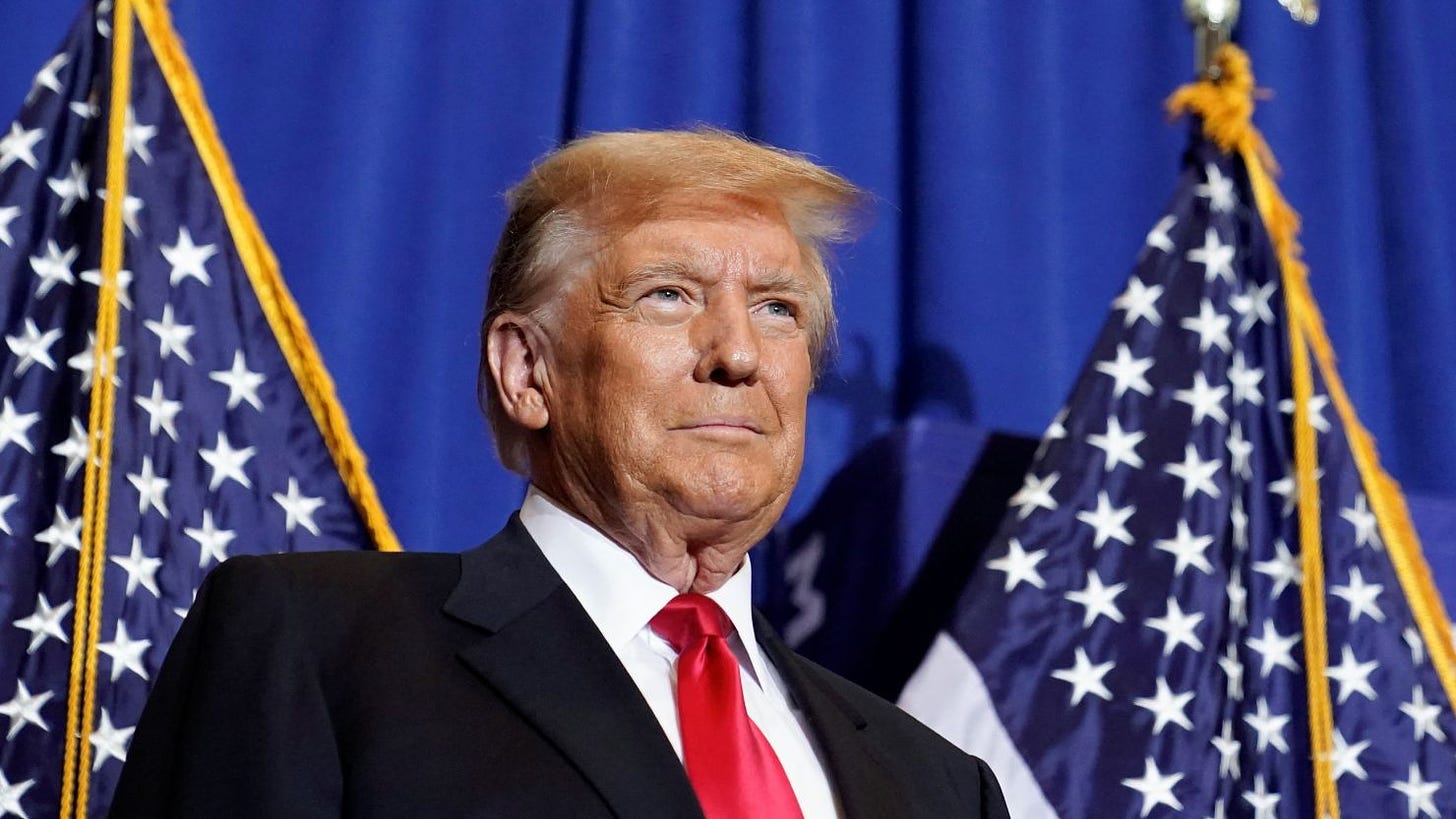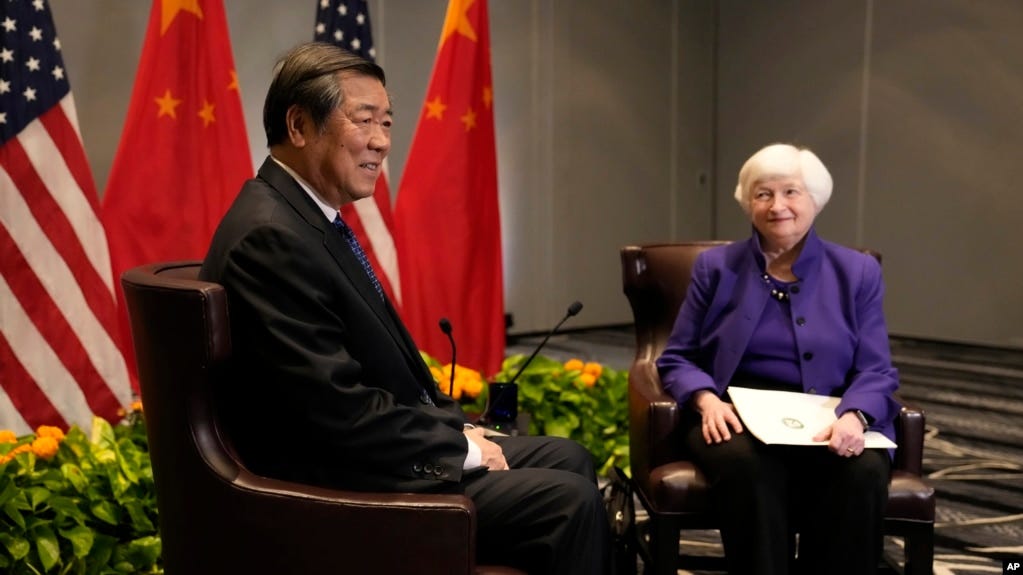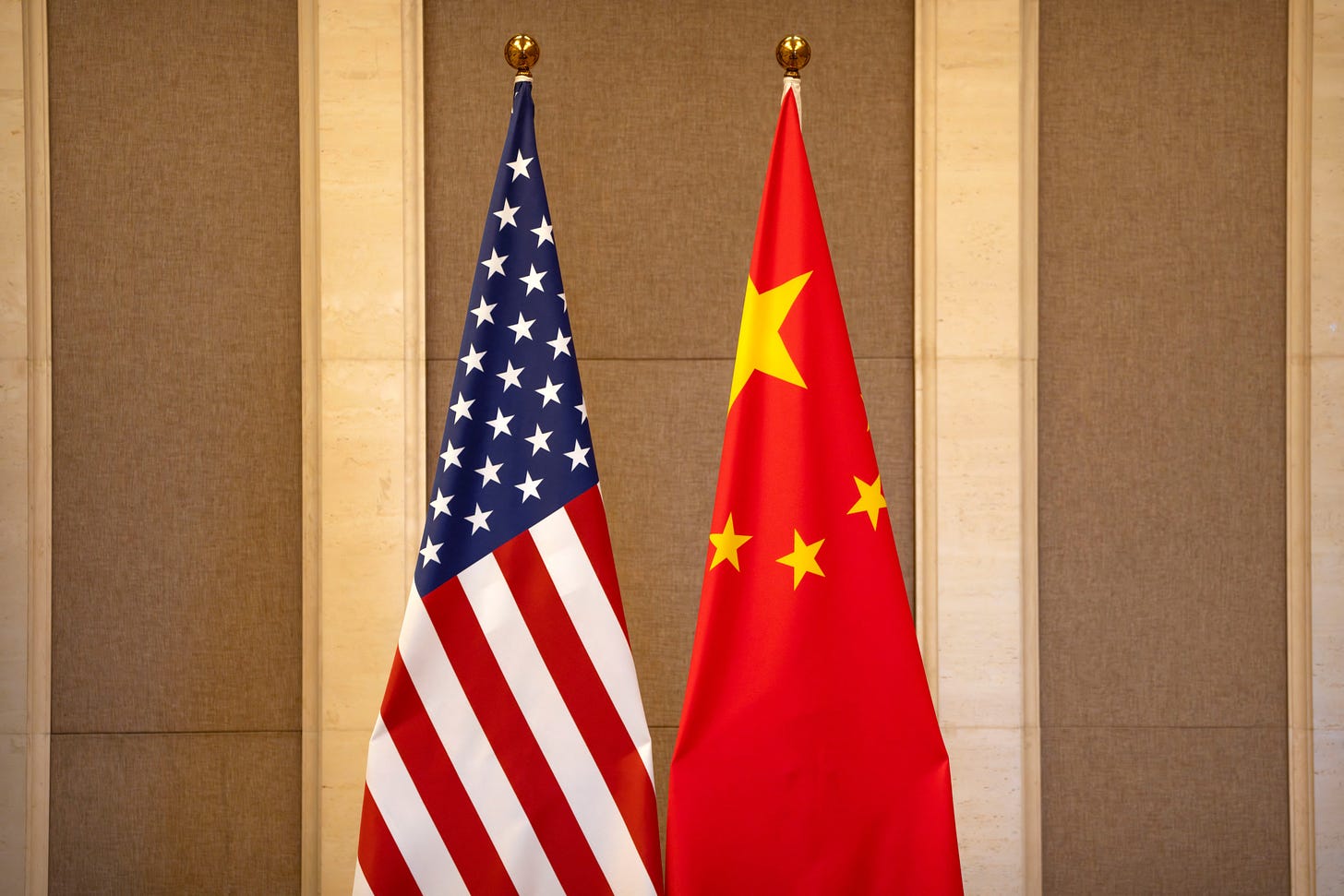Trump’s Tariff Threats Spark Beijing Talks
Trump suggests he would consider a tariff upward of 60% on all Chinese imports if reelected, US, China Officials Meet to Discuss Economy, Trade, Production, China expresses concerns to US over tariffs
UPDATES: Former President Donald Trump said Sunday he would consider imposing a tariff upward of 60% on all Chinese imports if he regains the presidency. His remarks come at a time of high economic and other tensions between the US and China.
The Economic Working Group of the U.S. and China met Monday and Tuesday in Beijing to discuss trade concerns and broader economic issues.
China's financial officials expressed concerns to visiting U.S. Treasury officials about U.S. tariffs, investment restrictions and sanctions set up to "suppress" Chinese companies, the Chinese finance ministry said on Tuesday.
Republican presidential candidate and former U.S. President Donald Trump holds a campaign rally ahead of the New Hampshire primary election, in Atkinson, New Hampshire, U.S. January 16, 2024.
Elizabeth Frantz/Reuters
Trump suggests he would consider a tariff upward of 60% on all Chinese imports if reelected
By Kate Sullivan, CNN
Former President Donald Trump said Sunday he would consider imposing a tariff upward of 60% on all Chinese imports if he regains the presidency. His remarks come at a time of high economic and other tensions between the US and China.
“No, I would say maybe it’s going to be more than that,” Trump said when asked by Fox News’ Maria Bartiromo on “Sunday Morning Futures” whether he would consider imposing a 60% tariff, as The Washington Post has reported.
As president, Trump slapped tariffs of 25% on $50 billion of Chinese goods in June 2018. Beijing countered with its own tariffs, and the spiral continued until the two countries arrived at an agreement in 2020. The Biden administration has largely kept the Trump-era tariffs in place.
The former president also said he thought China would try to interfere in the 2024 presidential election.
“I think they will, and they won’t be interfering on my behalf. We should go same-day voting, paper ballots, voter ID and no mail-in ballots,” Trump said.
Chinese leader Xi Jinping told President Joe Biden that China would not interfere in the 2024 US presidential election when the two men met in November, CNN has reported. But FBI Director Christopher Wray warned Wednesday that Chinese hackers are preparing to “wreak havoc and cause real-world harm” to the US.
Trump also praised Xi, whom he described as “a very good friend of mine during my term,” and said, “I want China to do great, I do.”
Trump would not say whether he would intervene if China tried taking over Taiwan, arguing that doing so would “jeopardize my negotiating ability with China.”
China’s ruling Communist Party views Taiwan as part of its territory, despite never having controlled it, and leader Xi has not ruled out the use of military force to “reunify” the island with the mainland.
The US, meanwhile, is obligated under the Taiwan Relations Act to provide Taiwan with the military means to defend itself, something Beijing regards as interference in its internal affairs.
Read more.
FILE —U.S. Treasury Secretary Janet Yellen, right, meets with Chinese Vice Premier He Lifeng in San Francisco, Nov. 10, 2023. The Economic Working Group the two established to maintain a healthy economic relationship between the two nations met this week in Beijing.
US, China Officials Meet to Discuss Economy, Trade, Production
By VOA News
The Economic Working Group of the U.S. and China met Monday and Tuesday in Beijing to discuss trade concerns and broader economic issues.
The meeting was the third since last September and involved senior officials from the U.S. Department of Treasury and China's Ministry of Finance, among other agencies.
According to a statement released Tuesday by Treasury, the U.S. and Chinese officials discussed "views on domestic macroeconomic outlooks," as well as other shared concerns such as debt in low-income and emerging economies.
U.S. officials also voiced their concerns about China's industrial overcapacity and how it affects workers and companies in the United States.
Overcapacity refers to China's increased investments into their manufacturing sector, which are expected to push production levels far above domestic demand.
According to an Atlantic Council analysis in December, "These trade flows will exacerbate the tense trading relationship it has with economies like the United States and the EU, who are also fostering domestic industries and jobs producing many of those same products."
Despite this, the U.S. delegation said it does not wish to decouple economies but instead to continue a strong and healthy economic relationship that will provide "a level playing field for American companies and workers."
Chinese Ministry of Finance officials expressed their own concerns, primarily regarding increased tariffs imposed by the U.S. and "two-way investment restrictions and sanctions targeting Chinese companies," according to Chinese state media.
The working group was established in September 2023 by U.S. Treasury Secretary Janet Yellen and Chinese Vice Premier He Lifeng to maintain a healthy economic relationship between the U.S. and China amid rising economic tensions.
The recent meeting was the first of 2024 and the first to be held in China.
Yellen last met with He in November for trade talks.
The group agreed to meet again in April.
Read more.
United States and Chinese flags are set up before a meeting between U.S. Treasury Secretary Janet Yellen and Chinese Vice Premier He Lifeng at the Diaoyutai State Guesthouse in Beijing, China, Saturday, July 8, 2023. Mark Schiefelbein/Pool via REUTERS/File Photo Purchase Licensing Rights
China expresses concerns to US over tariffs, sanctions in Beijing talks
By Reuters
China's financial officials expressed concerns to visiting U.S. Treasury officials about U.S. tariffs, investment restrictions and sanctions set up to "suppress" Chinese companies, the Chinese finance ministry said on Tuesday.
Both sides had "in-depth, frank, pragmatic and constructive" exchanges on their macroeconomic situation and policy, and developing countries' debt, among other issues in the meetings this week in Beijing, the ministry said.
They agreed to continue to maintain communications, it added.
In a separate meeting, China's vice premier He Lifeng also met with U.S. Treasury Undersecretary for International Affairs Jay Shambaugh on Tuesday, China's official Xinhua news agency reported.
The vice premier urged the two countries to deepen exchanges and cooperation to stabilise and develop the China-U.S. economic relationship, the agency added.
The talks underscore trade tensions between the world's two largest economies. Both have made overtures to ease the friction, especially as the U.S. ramps up export controls meant to keep the most advanced semiconductors out of China's hands.
China's vice minister of commerce, Wang Shouwen, expressed concerns about the restrictions on semiconductors and cloud services in China, fair treatment of Chinese companies in the U.S., and photovoltaic restrictions, according to a statement from the commerce ministry.
"Sino-U.S. economic and trade cooperation is a stabilizing force in the relations between the two countries, Wang said in a separate video call with U.S. Deputy Secretary of Commerce Marisa Lago, adding that China is ready to work with the United States, expand cooperation and manage differences.
Read more.





